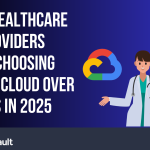HIPAA Vault is a leading provider of HIPAA compliant solutions, enabling healthcare providers, business organizations, and government agencies to secure their protected health information from data breaches, threats, and security vulnerabilities. Contact us at 760–290–3460 or www.hipaavault.com.

“Just as electricity transformed almost everything 100 years ago, today I actually have a hard time thinking of an industry that I don’t think AI (Artificial Intelligence) will transform in the next several years.” ~ Andrew Ng
What if your doctor prescribed you radiation, on the assumption of a cancerous mass on a blurry x-ray? (Sadly, I’ve heard such stories)
Wisely, you’d seek a second opinion, and probably switch doctors in a heartbeat.
Because though it’s true – x-rays do get misread 3-5% of the time, and suspicious lumps can be missed – you’d rather not get dosed with radiation if you can help it!
But now, what if that doctor’s detection capabilities – and subsequent treatment plan – could be significantly improved, with the use of artificial intelligence?
What once sounded like science fiction is happening now – just one of the amazing innovations in healthcare’s exploding digital transformation. (You can see the X-rays here.)
An Explosion of Data
Here’s another surprising statistic:
30% of the world’s data is produced by the healthcare industry.
Estimates are that by 2025, that number will reach 36% – and there appears to be no sign of slowing.
We’ve seen how artificial intelligence is improving the detection of cancer; here are 3 of the most dynamic advances helping to process this explosion of data:
1. Data-driven medical innovation – such as machine learning – is changing healthcare before our eyes.
Numerous innovative and connected technologies – from mobile technologies and telehealth to robotics and virtual surgery software – are contributing to the need to process greater and greater amounts of health data for immediate, actionable insights.
No wonder that 92% of healthcare executives now believe their future business value will depend upon the capabilities of their technology architecture, according to an Accenture report.
One such capability, machine learning, is having a profound effect. Consider this example from the Mayo Clinic:
As both an academic medical center and one of the most respected medical institutions in the world, Mayo Clinic desired to dramatically cut the time required to retrieve and analyze disparate sources of data.
The incoming data then needed to be harmonized to FHIR (Fast Healthcare Interoperability Resources) – a health standard for the exchange of electronic health records.
Enter Google’s BigQuery. An enterprise data warehouse that is scalable, serverless, and cost-effective, BigQuery offers built-in machine learning to work across clouds, enabling further machine learning models to be built and operationalized.
Without such advanced automation, a typical data analysis would normally take Mayo Clinic weeks. BigQuery was able to perform the same analysis in only an hour.
This allowed Mayo’s healthcare experts to spend far less time managing IT resources and focus more time on critical problem-solving – dramatically impacting both efficiency and costs.
Like Mayo Clinic, leading healthcare providers are leveraging BigQuery security and high-performance machine learning to uncover valuable insights in hard-to-retrieve records from disparate sources and massive data sets – such as legacy EHRs – some as old as a decade or more.
These providers realize that to stay competitive, they must make use of cutting-edge cloud technologies like Google’s BigQuery HIPAA compliance and a secure, scalable cloud for high flexibility and real-time data availability.
2. DLP and De-identification are Aiding Healthcare Data Security and HIPAA Compliance
Jeffrey Vasquez, an Enterprise Cloud Solutions Architect for Google, notes that two cutting-edge cloud capabilities – Cloud Data Loss Prevention (DLP) and Healthcare De-identification – are helping to keep sensitive health data private and secure.
In How Cloud tools help with healthcare data security, Vasquez says that Google’s data loss prevention (DLP) tools use advanced machine learning technology to help organizations identify and protect against the unauthorized sharing or unintentional exposure of confidential information.
For example, predefined rule sets can be designed to detect personally identifiable information (PII) such as social security numbers, health information, and financial data.
Administrators create the rules, which can then scan inbound and outbound email traffic to detect and prevent unauthorized sharing or unintentional exposure of sensitive data.
When an email, file, or chat message matches a predefined rule, the system can take several actions, such as sending an alert to the administrator or quarantining the content.
The system can also redact specified sensitive information from the message or transfer the content to another location for further investigation or processing.
“Cloud DLP can help identify PHI/PII and help to obfuscate it, allowing for use of that data while adding additional layers of protection for the privacy of the patient,” Steve Kluger and Nelly Wilson of Google note in Protecting Healthcare Data with DLP. “This additional layer of protection complements traditional security measures like access control, encryption-at-rest, and encryption-in-transit by adding a layer of protection that can change or mask the data itself. This helps attain a deeper level of “least privilege” access, or data minimization.”
DLP is used for several Google Cloud services, including Gmail, Google Drive, and Google Chat.
Google’s Data de-identification uses a Cloud Healthcare API to remove identifying information from data in a way that minimizes the risk of re-identification. Google Cloud’s de-identification tool is designed to preserve the utility of the data while protecting the privacy of individuals.
The API can detect sensitive data in DICOM instances (a digital imaging standard) and FHIR resources and remove identifying information from them using a variety of techniques, including masking, tokenization, and generalization.
As a Google Cloud partner, HIPAA Vault supports enterprise providers with Google’s compliant cloud and zero-trust security to help protect our clients’ valuable data.
3. Blockchain technology has numerous applications for healthcare data.
No, it isn’t just for bitcoin. A significant benefit of blockchain technology for healthcare has emerged, unique in its ability to securely store and share patient data.
While the use cases are numerous, blockchain health records can be stored on a decentralized ledger that is secure and accessible to authorized parties, leading to better transparency and interoperability between healthcare providers and systems.
The use of cryptography makes the data tamper-evident, meaning that any attempt to modify the data would be immediately recognized and traced back to the source. This enhances data security and integrity, as well as overall trust in the data.
Other ways blockchain is helping healthcare include:
- Improving supply chain management: The technology is being used to track and manage pharmaceuticals, medical devices, and other healthcare supplies throughout their lifecycle, including from production to distribution to patients. This could have a positive impact in combatting medication/controlled substance abuse.
- Facilitating medical research: Researchers can use blockchain to collect and analyze data from multiple sources in a secure and efficient manner, resulting in better insights and outcomes.
- Enhancing patient engagement: blockchain can enable patients to own their data and control access rights enabling them to share it with their healthcare providers.
- Improving security, and preventing fraud: As mentioned above, blockchain technology can establish trust and eliminate intermediaries that facilitate fraudulent activities. It can also be used to verify and validate the authenticity of medical prescriptions, insurance claims, and patient identity.
Overall, blockchain technology holds the potential to transform healthcare by significantly improving trust in data, tracking, and patient access to and control of their data.
A New Digitial Frontier
Ongoing digital transformation appears closely entwined with healthcare’s future. Artificial intelligence and machine learning have proven to be valuable predictive tools, with the potential to vastly improve healthcare outcomes.
And it’s not to say that the human touch has become less important, of course. Advances like machine learning will never replace a trained eye and open heart, and empathy for the patient will always be a primary part of effective care. But they can provide greater insight for better diagnosing, which can wisely be implemented into a patient’s treatment plan.
Healthcare organizations must contend with this rapidly changing digital landscape, therefore, harnessing the best of these cloud-based solutions for their particular applications.
HIPAA Vault’s fully-managed, secure infrastructure and enterprise cloud solutions are perfectly designed for the digital explosion, leveraging solutions like Managed BigQuery and DLP to help you achieve your specific clinical and administrative goals as well as reduce your budgetary concerns.
Talk to us about how we can be an extension of your team, and provide enterprise cloud hosting with 24/7 support services to assist you in your goal of delivering quality, safe healthcare.





